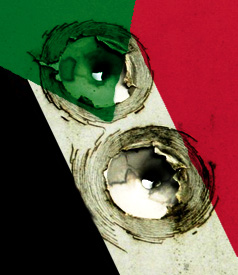Juba, Sudan — Clashes spread across a key border region in southern Sudan on Saturday following a wave of mutinies among southerners in the northern army, leaving at least 41 dead as Sudan begins to divide into two nations following a southern referendum on independence last month.
Official results show that southerners voted 99 percent for forming their own country, and full independence is set to take effect in July this year. The referendum was the core provision of a U.S.-brokered 2005 peace deal between Sudan’s Arab government in the north and the rebellious African south, ending decades of war that killed 2 million people.
The recent violence broke out on Thursday in Malakal, the capital of Upper Nile state, as the northern army, the Sudan Armed Forces, began withdrawing its remaining contingents in the south.
Former southern militiamen in the northern army mutinied against other southern soldiers and northern commanders, refusing to relocate to the north with all their weaponry. The fighting continued throughout the day on Friday. At least 22 are confirmed dead, mostly soldiers, according to a United Nations official, who said the fighting had mostly stopped by Saturday. The official could not be named because he’s not authorized to speak to the media on the matter.
Similar uprisings within the SAF ranks erupted on Saturday in the Upper Nile towns of Melut, Paloich, and Maban, said Malaak Ayuen, head of information in Southern Sudan’s army, the ex-rebel Sudan People’s Liberation Army.
“The fighting has spread across Upper Nile,” said Ayuen, who could not yet give total casualty figures. The SPLA has stepped in to try to quell the fighting but was not part of the original clashes, according to officials.
On Saturday, the uprising began at Paloich, the base of Sudan’s most productive oil fields, before spreading 20 miles to the SAF base in Melut town. There, at least 18 soldiers were killed, said Akuoc Teng Diing, the Melut County commissioner.
“The bodies are still being collected and the number is rising,” said Akuoc, speaking by phone from the clash site mid-day Saturday.
Although part of the northern army, the vast majority of the SAF soldiers in these bases are southerners. Many are longtime veterans who fought in the national army against the southern rebels.
But others only officially integrated into SAF after the peace deal. During the war, they were part of a patchwork tribal militias that controlled most of Upper Nile, supported by the northern Sudanese government in Khartoum to wage proxy war against the SPLA and keep the key border region open for oil exploration.
According to officials, it is these former militiamen who are behind the uprisings.
With all SAF forces now required to withdraw to the north and the southerners within its ranks disarmed and discharged back to the south, the ex-militia elements are resisting the move.
The mutineers also are fighting to keep some of the heavy weaponry in the south, and in their hands. “SAF is saying no, this is ours, we can take it if we want,” said the U.N. official.
The fighting in Malakal had mostly stopped by Saturday, but isolated gunshots could still be heard.
In Melut county, the mutineers have grabbed the upper hand.
“The pro-north group (of 100-120 men) has been evicted from the barracks, they are at-large, they are armed,” said the U.N. official.
SAF bases are spread across the south in major towns and oil fields, and they all must be withdrawn to the north by April.
Large contingents of the SPLA remain in the north as well, especially in flashpoint border states of Southern Kordofan and Blue Nile. The SPLA says it has no plans to immediately withdraw from those areas.
Join us in defending the truth before it’s too late
The future of independent journalism is uncertain, and the consequences of losing it are too grave to ignore. To ensure Truthout remains safe, strong, and free, we need to raise $43,000 in the next 6 days. Every dollar raised goes directly toward the costs of producing news you can trust.
Please give what you can — because by supporting us with a tax-deductible donation, you’re not just preserving a source of news, you’re helping to safeguard what’s left of our democracy.
